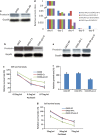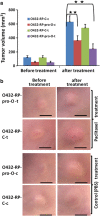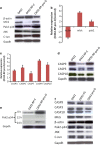Prostasin may contribute to chemoresistance, repress cancer cells in ovarian cancer, and is involved in the signaling pathways of CASP/PAK2-p34/actin
- PMID: 24434518
- PMCID: PMC4043260
- DOI: 10.1038/cddis.2013.523
Prostasin may contribute to chemoresistance, repress cancer cells in ovarian cancer, and is involved in the signaling pathways of CASP/PAK2-p34/actin
Abstract
Ovarian cancer is the deadliest of gynecologic cancers, largely due to the development of drug resistance in chemotherapy. Prostasin may have an essential role in the oncogenesis. In this study, we show that prostasin is decreased in an ovarian cancer drug-resistant cell line and in ovarian cancer patients with high levels of excision repair cross-complementing 1, a marker for chemoresistance. Our cell cultural model investigation demonstrates prostasin has important roles in the development of drug resistance and cancer cell survival. Forced overexpression of prostasin in ovarian cancer cells greatly induces cell death (resulting in 99% cell death in a drug-resistant cell line and 100% cell death in other tested cell lines). In addition, the surviving cells grow at a much lower rate compared with non-overexpressed cells. In vivo studies indicate that forced overexpression of prostasin in drug-resistant cells greatly inhibits the growth of tumors and may partially reverse drug resistance. Our investigation of the molecular mechanisms suggests that prostasin may repress cancer cells and/or contribute to chemoresistance by modulating the CASP/P21-activated protein kinase (PAK2)-p34 pathway, and thereafter PAK2-p34/JNK/c-jun and PAK2-p34/mlck/actin signaling pathways. Thus, we introduce prostain as a potential target for treating/repressing some ovarian tumors and have begun to identify their relevant molecular targets in specific signaling pathways.
Figures





References
-
- Siegel R, Naishadham D, Jemal A. Cancer statistics, 2012. CA Cancer J Clin. 2012;62:10–29. - PubMed
-
- Thigpen T. First-line therapy for ovarian carcinoma: what's next. Cancer Invest. 2004;22 (Suppl 2:21–28. - PubMed
-
- Markman M, Liu PY, Wilczynski S, Monk B, Copeland LJ, Alvarez RD, et al. Phase III randomized trial of 12 versus 3 months of maintenance paclitaxel in patients with advanced ovarian cancer after complete response to platinum and paclitaxel-based chemotherapy: a Southwest Oncology Group and Gynecologic Oncology Group trial. J Clin Oncol. 2003;21:2460–2465. - PubMed
-
- Mei L, Chen H, Wei DM, Fang F, Liu GJ, Xie HY, et al. Maintenance chemotherapy for ovarian cancer. Cochrane Database Syst Rev. 2010;9:CD007414. - PubMed
-
- Kikuchi Y, Kita T, Takano M, Kudoh K, Yamamoto K. Treatment options in the management of ovarian cancer. Expert Opin Pharmacother. 2005;6:743–754. - PubMed
Publication types
MeSH terms
Substances
LinkOut - more resources
Full Text Sources
Other Literature Sources
Medical
Research Materials
Miscellaneous

